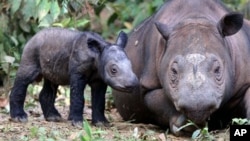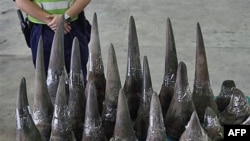Several species of rhinoceros are currently critically endangered and some sub-species have become extinct in recent years. The main threat to rhino populations is from poaching in order to harvest their horns, which are in some cases, worth more than gold on the black market.
“It’s valuable for all the wrong reasons,” said U.S. Under Secretary for Economic Growth, Energy, and the Environment Robert Hormats:
"There are people who unfortunately and mistakenly think it has some medicinal value, among other things that it’s a cure for cancer, which it most certainly is not. There is no scientist in the world who will argue that it is."
Under Secretary Hormats noted that people who are choosing rhino horn to treat cancer or other conditions are cheating themselves out of real treatment options. They are also encouraging the inhumane slaughter of the rhino population and contributing to the funding of international criminal gangs that traffic not only in rhino horn, but in arms and drugs and that can have connections to terrorist organizations as well.
The U.S. seeks to fight this scourge through a wide range of efforts, said Under Secretary Hormats. Education campaigns have been launched in transit countries and the parts of the world that use rhino horn. Helping the countries that are home to such wildlife is important as well, said Under Secretary Hormats:
We, in many cases, help to develop the capacity to police their forests or their wildlife preserves. We try to help them to develop strong rules and regulations to prevent this, and the capacity to do it. We encourage them and their courts to take tougher views when these people are caught."
Further, he noted that countries such as Namibia, Botswana and increasingly South Africa, have programs that encourage a village-wide interest in stewardship for all local wildlife. Such stewardship increases income for a community in the form of tourism.
“You can kill an animal, you might get the money from the animal once,” he said, “If you keep animals flourishing, then people come year after year.”
The U.S. is committed to efforts to fight wildlife trafficking in all of its forms.
“It’s valuable for all the wrong reasons,” said U.S. Under Secretary for Economic Growth, Energy, and the Environment Robert Hormats:
"There are people who unfortunately and mistakenly think it has some medicinal value, among other things that it’s a cure for cancer, which it most certainly is not. There is no scientist in the world who will argue that it is."
Under Secretary Hormats noted that people who are choosing rhino horn to treat cancer or other conditions are cheating themselves out of real treatment options. They are also encouraging the inhumane slaughter of the rhino population and contributing to the funding of international criminal gangs that traffic not only in rhino horn, but in arms and drugs and that can have connections to terrorist organizations as well.
The U.S. seeks to fight this scourge through a wide range of efforts, said Under Secretary Hormats. Education campaigns have been launched in transit countries and the parts of the world that use rhino horn. Helping the countries that are home to such wildlife is important as well, said Under Secretary Hormats:
We, in many cases, help to develop the capacity to police their forests or their wildlife preserves. We try to help them to develop strong rules and regulations to prevent this, and the capacity to do it. We encourage them and their courts to take tougher views when these people are caught."
Further, he noted that countries such as Namibia, Botswana and increasingly South Africa, have programs that encourage a village-wide interest in stewardship for all local wildlife. Such stewardship increases income for a community in the form of tourism.
“You can kill an animal, you might get the money from the animal once,” he said, “If you keep animals flourishing, then people come year after year.”
The U.S. is committed to efforts to fight wildlife trafficking in all of its forms.





